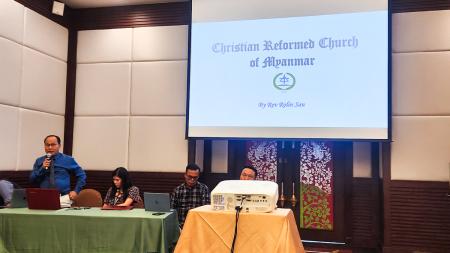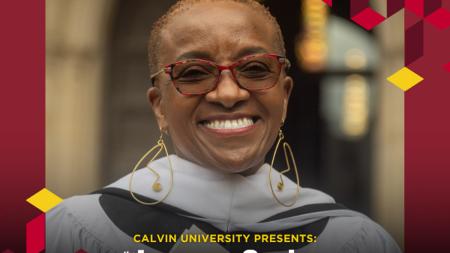Helping Kids Before They Get to the Border
Association for a More Justice Society
Many of the more than 50,000 unaccompanied children who have arrived at the U.S.-Mexican border since late 2013 have been fleeing Honduras, says Kurt Ver Beek, co-founder of the Association for a More Just Society (AJS).
AJS is a social justice organization based in Tegucigalpa, the capital of Honduras. One of its partners is the Christian Reformed Church.
Ver Beek recently spoke about the children at the border, as well as discussed the work of AJS in connection to this issue, with a luncheon group in the Grand Rapids, Mich. office of the CRC.
“We see all of these children at the border and there are many questions. Who are they? Why are they there? ” said Ver Beek, who is also a professor of sociology at Calvin College.
“The answer to this situation is complicated and messy. Some of these kids may have a shady past, but others are trying to escape violence. The truth is we don’t know all of the answers,” he says.
The U.S. Customs and Border Protection agency says it has taken into custody 52,193 unaccompanied minors since January, a 99 percent increase over 2013.
News outlets have featured many stories, including footage of children riding atop freight cars to get to the U.S. and of an angry mob that filled the streets of a California town to turn back buses carrying the children.
Meanwhile, as the problem escalates and these children remain in detention, President Obama and Congress are debating how to respond.
Ver Beek says ASJ has programs in place which work to address some of the root causes of why the children are leaving Honduras.
These causes include a corrupt police and legal system, a poor education system that breeds hopelessness, and especially gang violence stemming from the drug trade, he says.
“Most of the drug flights now come into Honduras. As other countries have clamped down on drug trafficking, Honduras has become the easiest place to do business,” says Ver Beek.
Two rival drug gangs are currently at war, vying for power and influence, and children and young people, especially males, are caught in the middle.
In June, 32 children were murdered in Honduras. Last year, 1,014 people under the age of 24 were murdered.
In this environment, parents want to get their sons out before they reach 15 or 16, says Ver Beek.
“If you are a parent, what are you thinking?” says Ver Beek. “They want to get them out before they get involved in a gang.”
Parents also believe things they have heard that their children will be welcomed when they reach the border.
With a staff of nearly 70 people, AJS works in many grassroots ways to address the quality of life in Honduras. They seek, says Ver Beek, in everything they do to be “brave Christians” who take Christ’s message of mercy and justice into all parts of society.
And one important area has to do with violence.
He cited an instance in his own neighborhood where he and his wife, Jo Ann, witnessed two murders. Many people warned them about getting involved, but they enlisted the support of a retired police officer.
“This officer had a good reputation and he was able to get a another, honest police officer to work with witnesses and a prosecutor willing to take the case,” he said.
The cases went to trial and the killers were convicted — in a country in which only two percent of homicides are resolved through the courts.
Because they saw justice done, their neighbors have started to believe that the legal system can work, says Ver Beek.
In a similar way, they have been working with victims of sexual abuse and then, along with many other faith-based groups, they have been putting pressure on the government to get rid of bad police officers and hire honest ones, he says.
They have also been working to improve the school system, which can start to give young people hope once they have a better opportunity to receive a good education, says Ver Beek.
In another program, they offer legal and psychological counseling complemented by programs for at-risk youth that offer constructive alternatives to participation in gangs and substance abuse.
“If we are successful with these efforts, parents shouldn’t want to get their kids out of Honduras,” he says.


